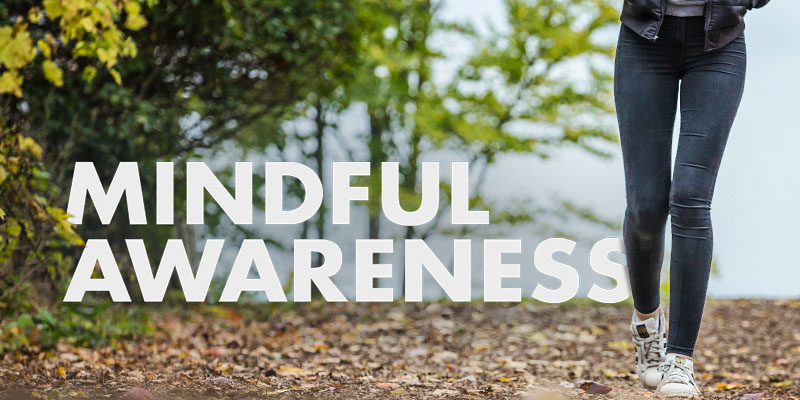Feeling unfocused? Stressed? Anxious? Everyone feels these things from time to time. But with the Covid-19 pandemic, many people are experiencing a period of prolonged uncertainty for the first time. This uncertainty has negative impacts on our health and well-being, causing us to default to an “autopilot” mode – a defense mechanism that gets us through the day without truly addressing what we are feeling on the inside. One tactic that can help us cope in a healthy way is mindful awareness.
You may have heard about mindfulness, or mindful awareness, in connection with yoga or meditation. While it has roots in those disciplines, mindfulness is something everyone can do- and you don’t have to be flexible to do it! The principle behind mindful awareness is this: noticing what is happening in the present moment. That last piece is key. Noticing the present means you are not thinking about the past (and all the things you wish you would have done) or the future (all the things that could happen or might happen). Anxiety and fear often exist in thoughts outside of the present moment.
Research shows that practicing mindful awareness has positive outcomes for our minds, brains, bodies, and behaviors. It can lower anxiety, help with focus and attentiveness, improve sleep and lower stress levels. There are two primary ways you can begin to practice mindful awareness: informal practice and formal practice.
Informal practice involves being aware of tasks you are doing throughout the day. At any time during your day, stop and notice the sounds, smells and sights around you. Notice how a paper feels in your hand. Listen to a bird singing outside. Smell cookies in the oven. Over time, turn these mindful moments inward. What are you feeling in this moment? Listen to the sound of your breathing. Over time it will become easier to master these techniques and you may wish to initiate a formal practice.
Formal mindful awareness means you set time aside each day for the practice of being mindful – on purpose. Maybe set aside 2 minutes before your next Zoom meeting to close your eyes and focus on your breathing. Notice what is going on around you. Your mind might wander, and that’s ok. Notice your thoughts and acknowledge them. Feel what is happening in your body.
Most people assume that in order to practice mindful awareness, you need to be sitting still, in a meditation pose, on a yoga mat. Not true. Mindful awareness can take place anywhere, at any time. One of the best ways to notice what is around you is to go for a walk outside. Listen to the sound of leaves or grass crunching beneath your feet. Smell the blooming flowers. Feel the breeze on your face. You can do this for any amount of time that you like.
Over time, this practice will help you become aware when you’re feeling anxious. The goal is to notice those thoughts and be able to respond to them more quickly. You will also be better equipped to recognize those emotions and have better control over your emotional reactions, especially when feeling stressed. An added benefit: mindful awareness helps you be a better listener and communicator. Really listening and noticing what your clients are saying without an agenda of your own (like thinking of what you want to say next in the conversation) will serve you well in both business and your personal relationships. Try it and let us know what you think!
Want to learn more? Contact us at 314-991-4641 or visit our website at vandivergroup.com/contact/.
By Laura Vandiver, Senior Research Strategist and National Board-Certified Health & Wellness Coach at The Vandiver Group in St. Louis, Missouri
Follow The Vandiver Group on Facebook, Twitter, LinkedIn and Instagram. Read our other blogs here.

